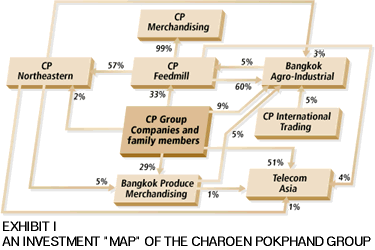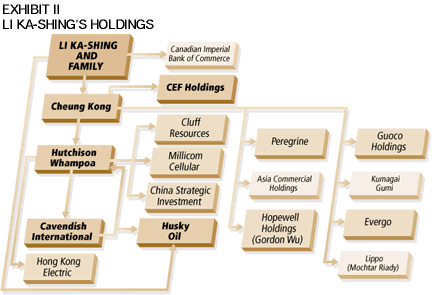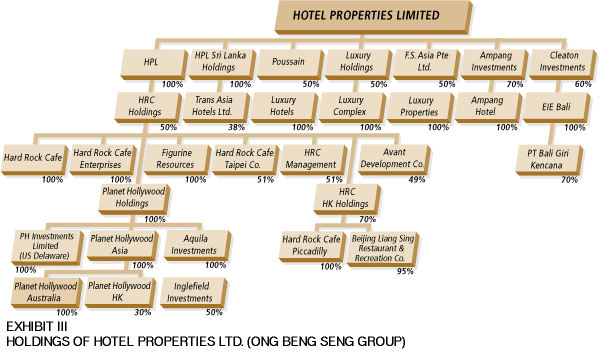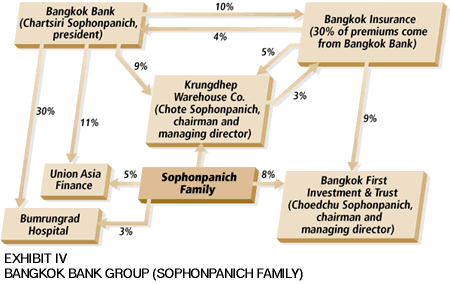The Bamboo Network: Asia's Family-run Conglomerates
Why have family-owned conglomerates founded by ethnic Chinese become key economic factors throughout Asia? The answers are trust and tradition.
(originally published by Booz & Company)One of the most important economic developments since the end of the Cold War is occurring with little notice in Southeast Asia. In Thailand, Malaysia, Indonesia, Taiwan, Singapore, Vietnam, the Philippines and the Coastal Zone of China, a remarkable economic change is taking place led by overseas Chinese business families, or what could be called the bamboo network.
Valuable lessons for Western businesses can come from learning how these families came to dominate and to propel the economies of Southeast Asia. With little more than the shirts on the backs, the founders of this bamboo network typically fled China at about the time when Chairman Mao Zedong proclaimed the founding of the People's Republic of China on October 1, 1949. Like an army of Horatio Algers, they worked hard in their new homes, saved most of what they earned and then put it all into their own businesses.
The story told by a former student of mine, now back in Hong Kong, is typical. He said that when his grandfather came to the United States he got a job ironing shirts in a hand laundry. After a number of years he had saved enough to go to Hong Kong and invest $50,000 (Hong Kong) in the rice business. That business is now a huge conglomerate spread over Asia and Australia.
Today, many small family companies such as the one started by my former student's grandfather have grown into enormous conglomerates with dozens of related companies spread throughout Southeast Asia and beyond. Not only are these enterprises key economic factors in the region, they have unique abilities to avoid dealing with government regulations and restrictions because of their ability to shift money, people and resources from one country to another.
The combined output of the 55 million overseas Chinese is equal to a good-sized country, or close to $600 billion. Ethnic Chinese are major and sometimes prime sources of capital and entrepreneurship in Singapore, Thailand, Malaysia, Indonesia, Taiwan, Hong Kong, the Philippines, Vietnam and their former homeland of China.
The achievements of the members of the bamboo network are impressive. In Indonesia, the businesses of Liem Sioe Liong account for 5 percent of the country's economy. In Hong Kong, Li Ka-shing owns 12 percent of the listed stocks. In Thailand, ethnic Chinese control the four largest private banks.
The successful ethnic Chinese business family controls dozens and dozens -- sometimes hundreds -- of interlocking, medium-sized businesses in four, five or more countries.
This array of family relationships extends throughout Southeast Asia, where entrepreneurs, business executives, traders and financiers of Chinese background are the major players in the local economies.
The founders of these overseas Chinese businesses are a fascinating breed. They typically started with little wealth, building their family enterprises from scratch and working, saving, and reinvesting at prodigious rates. The Confucian ethic is alive and well in the bamboo network. The family is the basic unit of management. This provides loyalty, flexibility, speedy decisions and low overhead. It also breeds a crucial business element: trust.
Centralized family control minimizes company bureaucracy and paperwork -- and leaves a very modest paper trail for potential government investigators. Key information is related verbally and retained in the heads of the senior managers rather than in the tremendous flood of paperwork typical in Western business. Money is borrowed from family members or friends on trust. Transactions of great size are often dealt with by common understanding and a note jotted in a diary.
A good example is Henry Sy, the most successful Chinese entrepreneur in the Philippines. When this modest billionaire invites his children and grandchildren for Sunday lunch, they all come. After all, each of his six children is an executive in his company. While the family gathering may be a social occasion, it also serves as a gathering of senior management to discuss planning and finance.
Traditionally, the head of the family makes the main decisions.
Within the organization, the flow of information is tightly controlled. The amount of company knowledge given to a specific subordinate depends on the degree of trust that the leader has in the individual. Most, if not all, of the top management positions are filled by family members. Other strategic posts are usually reserved for close relatives and for those who have worked for the family for long periods of time. The authoritarian leadership style seems to work because of the moral authority of the founder and his unrivaled experience.
So while outside professional managers of these enterprises may be well paid, they quickly encounter the limits of their authority, especially when they deal with family members who nominally report to them.
Simon Murray, who served as managing director of a major enterprise in Li Ka-shing's multibillion dollar family group, put it this way: "I'm just the guy driving the truck. Li's in the back, telling me which way to go."
Rungs Of The Ladder
Typically, one generation of family leadership passes on control to the next. Although the Salim Group of Indonesia remains securely in the control of its founder, Liem Sioe Liong, his youngest son, Anthony, is in charge of operations.
Another example is provided by the Formosa Plastics Group headed by Y. C. Wang. Mr. Wang has displayed a strong devotion to keeping control of his empire within the family. Each of his 10 children is an executive in the family business. His brother, Y. T. Wang, is president of Formosa Chemicals and Fibre, and runs that business with Y. C.'s son, William Wang. Y. C.'s daughter, Cher Wang, is president of Everex Systems, a personal computer manufacturer in California. Another son, Winston Wang, is senior vice president of Nan Ya Plastics, which produces circuit boards and other electronic components.
Daughter Charlene Wang and her husband are president and chairman of First International Computer, the world's largest manufacturer of motherboards, the circuit boards used to make personal computers. (Ostensibly, the daughter started this business on her own. However, she secured the necessary initial financing with her father's guarantee.)
In 1993, Robert Kuok officially retired from the day-to-day running of the Kuok Group's vast array of companies, which remains essentially a family-run enterprise. In the traditional Chinese manner, he divided the Hong Kong and Singapore/Malaysian operations between two sons, with the older son taking over the Hong Kong location. Equally in the Chinese business tradition, the "retired" Mr. Kuok keeps a close eye on the business and influences major decisions.
The head of an expatriate Chinese company typically is a "paterfamilias." He is all powerful in both social and business spheres. He entrusts key activities and positions to family members: sons, sons-in-law, nephews, brothers, uncles and occasionally daughters. Within the family, confidence in his judgment borders on the absolute. The combination of owner and manager avoids the "agency" problems that Western business face in getting managers to promote the interests of the owners.
Frequently, the retiring heads of first-generation Chinese businesses summon their eldest sons to return home to take over. In cases in both Taipei and Hong Kong, for instance, the eldest sons were doctors with established practices in the United States. Both abandoned their professions and returned to take over the family business.
When Y. K. Pao, the Hong Kong shipping and property magnate, arranged for his succession, he had a problem: no sons. Mr. Pao divided his business among his four sons-in-law: a Chinese doctor, a Japanese architect, a Shanghai banker and an Austrian lawyer. Despite their unusually diverse backgrounds, apparently Mr. Pao had no thought of turning over the businesses to professional managers.
An Informal And Flexible Structure
As a result of some of these management chains, these companies have not had to downsize to stay competitive; they never upsized in the first place. Due diligence to them is not an endless array of studies, memos and meetings with a large and expensive retinue of lawyers, accountants and investment bankers. It's a conversation among trusted friends and relatives. Kinship, dialect and common origin -- in a clan or a village -- provide the basis for mutual trust in business transactions in the network, even when conducted at great distances.
A common core of values is remarkably persistent, notably hard work, conscientiousness, loyalty to superiors and trust among family and friends. The resultant certainty and informality facilitate business transactions over or around governmentally imposed barriers.
For example, when Taiwan had strict exchange controls, someone in the bamboo network could deposit a large sum with a gold shop in Taipei and the next day a relative could withdraw the money from an affiliated gold dealer in Hong Kong.
As the family conglomerates have grown, they have served as incubators for the future management of related enterprises. The head of the Lippo Group in Hong Kong, for instance, got his start with the Salim Group of Indonesia. The head of the Salim Group got his initial financing from the Sophonpanich family that controls the Bank of Bangkok. Each of these are very successful ethnic Chinese entrepreneurs who now regularly join forces in making new investments in China, Southeast Asia and elsewhere.
Most of the investment capital flowing into China does not come from Europe, Japan or the United States, but from these overseas Chinese. The movement of China from Communism to capitalism is being financed and managed by those who fled or were expelled in 1949, and by their descendants.
Funnel For Western Investment
Since Deng Xiaoping launched his economic open-door policy in 1978, overseas Chinese have accounted for about 80 percent of all foreign investment in China.
In fact, most of the Western companies that have moved successfully into mainland China, including Motorola, Coca-Cola, KFC, Lockheed, Chrysler and Procter & Gamble, started joint ventures with members of the bamboo network. Western companies have what the members of the bamboo network lack in some cases, including technical expertise, consumer marketing skills and the ability to manage large-production operations.
In contrast, the typical bamboo network enterprise has a low profile, which reduces the likelihood of becoming a target of public criticism or governmental action. The enterprises serve as middlemen, making components for someone else. The owners know the key government officials of the countries in which they operate and they are great deal makers. Yet they do not produce or market any major consumer product and they therefore have little experience in managing large manufacturing operations. They are much better at real estate than in automobile production; much better in hotels than in aircraft production.
For these and other reasons, synergies between East and West may be difficult to arrange, and trying to transform an informal Chinese enterprise into a bureaucratic, Western-style corporation is bound to fail.
Still, partnerships can be mutually beneficial if the players appreciate the differences in each other's operating methods. There is no question that the ethnic Chinese business can offer essential entree to leading growth sectors of Asia.
Several thumbnail sketches of specific bamboo network enterprises may help to explain the very special nature of this unique phenomenon.
Charoen Pokphand Group Of Thailand
The Charoen Pokphand Group, whose wealth is estimated at more than $5 billion, is the largest conglomerate in Thailand. It began as a small seed company founded by a Chinese merchant who moved to Bangkok. The company grew into a conglomerate as it expanded the market for its seed. CP now controls more than 200 companies in Thailand, Indonesia, Taiwan, Turkey, Portugal and the Philippines. CP is also the largest investor in mainland China, with interests in almost every province. Only half of CP's revenues come from its Thai operations.

Exhibit I shows the tip of the iceberg: the major publicly held businesses owned and controlled by the family. The family owns a controlling 33 percent of the key company, CP Feedmill. It owns another 5 percent of Feedmill through Bangkok Industrial.
CP also controls Bangkok Agro-Industrial through a direct 9 percent ownership plus 5 percent from Bangkok Produce Merchandising and another 5 percent from CP International Trading and 3 percent from CP Northeastern. CP Feedmill, in addition, owns a controlling 60 percent of Bangkok Agro-Industrial, 99 percent of CP Merchandising and 57 percent of CP Northeastern.
Exhibit I is a simplified version of a far more complex reality. For example, CP's investments on the mainland are not made directly by its headquarters in Bangkok, but by a subsidiary in Hong Kong. The subsidiary owns a controlling interest in the umbrella corporation that actually makes the investments in China. Each of the individual investments takes the form of a joint venture, with one or more native enterprises.
Li Ka-Shing Group Of Hong Kong
Li Ka-shing, a Hong Kong real estate tycoon with a personal net worth estimated at $6 billion, moved to Hong Kong as a poor refugee from China. He began to work at age 12 for a company making plastic flowers. Mr. Li soon started his own plastics company. His little plastic company now owns the controlling interest in Hutchison Whampoa, one of the biggest ex-British "hongs" that traditionally dominated Hong Kong. It also controls the Husky Oil Company of Canada and the Hong Kong Electric Company and owns 9.4 percent of Mochtar Riady's Lippo Ltd., which has gained some notoriety recently. (See Exhibit II.)

Hutchison Whampoa owns a controlling interest in Cavendish International, while Cavendish holds a minority interest in Hutchison. Moreover, Cheung Kong is the family's basic holding company, but the family owns the Imperial Bank of Commerce of Canada directly. Also, Mr. Li controls Husky Oil through ownership by the family directly, plus shares held by Hutchison Whampoa as well as its subsidiary Cavendish International.
Over the years, Mr. Li has teamed up with a variety of bamboo network enterprises. For example, he has joined the Lippo Group of Indonesia and Taiwan International Securities in financing the New China Hong Kong Group, which also includes Singapore's Trade Development Board and 10 mainland Chinese companies and ministries.
Ong Beng Seng Group Of Singapore
A very special characteristic -- perhaps protective -- of the bamboo network is that the family-oriented enterprises rarely seem to own their individual companies outright, in contrast to the notion of the wholly owned subsidiary so familiar in the United States.

Exhibit III shows the publicly owned Hotel Properties Limited. This is the key holding company of the Ong Beng Seng Group of Singapore. HPL owns 100 percent of HPL of Singapore. In turn, HPL of Singapore owns 50 percent of HRC Holdings. HRC Holdings operates Hard Rock Cafes throughout Southeast Asia. HPL also holds a 50 percent interest in Luxury Holdings, which, in turn, owns upscale hotels throughout the area. HRC Holdings owns 70 percent of HRC Hong Kong Holdings, which holds a 95 percent interest in the Beijing Liang Sing Restaurant and Recreation Company. Also, HPL holds 60 percent of Cleaton Investments, which has a 70 percent interest in PT Bali Giri Kencana through wholly owned EIE Bali.
HRC Holdings also owns outright Planet Hollywood Holdings, which has a 30 percent interest in Planet Hollywood, a Hong Kong-based enterprise.
Bangkok Bank Group
The Sophonpanich family, a key bamboo network enterprise in Thailand, some time ago adopted a Thai name. The key holding of the family is the Bangkok Bank, the largest financial institution in the country. (See Exhibit IV.) The bank holds 10 percent of the shares of Bangkok Insurance and also provides 30 percent of its premium income. In turn, the insurance company owns 4 percent of the bank as well as 9 percent of Bangkok First Investment & Trust and 5 percent of Krungdhep Warehouse.

The family owns another 8 percent of the Investment company and its Warehouse subsidiary owns 3 percent of the Insurance company. The Bangkok Bank holds 9 percent of the stock of the Warehouse company as well as 30 percent of the Bumrungrad Hospital. The family owns 3 percent of the hospital directly.
The widespread control of the Sophonpanich family can be seen by the identity of the key officers in the network. Chartsiri Sophonpanich is president of the Bangkok Bank. His brother Chote is chairman of the Warehouse and his brother Choedchu runs the Investment company.
Salim Group Of Indonesia
The Salim Group, founded by Liem Sioe Liong, controls more than 60 enterprises in Hong Kong and Singapore, in addition to the majority of Indonesia's blue chip companies: Indocement, Indosteel and Indomilk.
Salim exemplifies the transnational nature of the bamboo network. Salim manages two ports in China in a joint venture with a company linked to the government of Singapore. This business is conducted through a three-times-removed unit, the Netherlands-listed Hagemeyer Group, which, in turn, is owned by a Hong Kong-listed corporation that is a part of the Salim Group, headquartered in Indonesia.
The First Pacific Company is the Salim Group's major Hong Kong subsidiary (Salim is Mr. Liem's Indonesian name, but he usually is called by his Chinese name, Liem Sioe Liong). First Pacific is listed on the Hong Kong Stock Exchange. Of First Pacific's operating companies, only its Pacific Link Communications is based in Hong Kong. The others are elsewhere in East Asia, notably Thailand, the Philippines and Indonesia. As noted earlier, Hagemeyer does business in Asia, but is basically a Dutch company.
In 1938, a penniless Mr. Liem left China for Java. He started a small trading company. During the Indonesian war of independence, Mr. Liem supplied the rebels with clothing, food and arms. When the war was over, his friend Suharto, who became president, did not forget him. In free Indonesia, Mr. Liem was allowed to start companies in product areas ranging from nails to banking. Salim Group's flagships in Hong Kong and Singapore operate in 25 countries in Asia, North America and Europe. The Group maintains business interests in distribution, property management, financial services and telecommunications.
The Salim Group has teamed up with the Kuok family of Malaysia to develop a hotel and golfing resort in Indonesia and a cement factory in Wuhan, China. On occasion, both groups team up with Thailand's CP Group.
Kuok Group Of Malaysia
As noted earlier, no widely known consumer products have a Chinese brand name. The members of the bamboo network produce for others. They provide raw materials or manage real estate. Their operations include wholesaling, financing and transportation. An example of this specialization on an international scale is the Kuok Group of Malaysia.
Kuok's businesses include shipping, commodity trading, iron ore mining and sugar plantations across Southeast Asia. They also include the influential South China Morning Post. None of these enterprises involves products marketed via the Kuok name. The Group's most consumer-oriented enterprise, its luxury hotels, bears names such as Shangri-La.
Substantial Political Risk
The future political risk facing the overseas Chinese business families is substantial. However, their ability to work successfully across national borders is a prime asset. Great uncertainty is attached to any scenario that involves China. Nevertheless, the members of the bamboo network will attempt to accommodate the changing political and economic environment and take full advantage of the opportunities provided by an increasingly globalized marketplace. As the saying goes, "Bamboo bends; it does not break."
Under the most optimistic scenario, the government on the mainland will continue to move toward capitalism and relax some of the controls over its people. In that event, the bamboo network will face to the East, to mainland China. The overseas Chinese will develop closer ties with the mainland. A happy unification with Hong Kong would be the basis for closer ties with Taiwan. On the other hand, should China revert to Communism -- or mishandle the integration of Hong Kong -- the bamboo network will face to the West. Overseas Chinese commercial families will develop closer ties with North America and Western Europe. At home, they will emphasize the substantial opportunities elsewhere in Southeast Asia and in Australia. An old saying among overseas Chinese is, "Keep your bags packed at all times."
Under either eventuality, the bamboo network will survive and prosper. The future of these family-oriented enterprises will be in the hands of the American-educated younger generation. They will seek to exploit the tremendous possibilities that arise from combining their unique cultural characteristics with modern management and advanced technology. The major remaining question is whether they can pull off the combination of the best of the East and the West.
The shortcomings of the family-run businesses of the bamboo network are not to be underestimated, especially their low-tech nature, limited marketing capability and inbred management styles. Nevertheless, China and Southeast Asia are the booming part of the global economy. We must know more about them because they can be our customers, suppliers or competitors -- and likely all three.
There is much that Western businesses can learn from the bamboo network.
First and foremost, family business is alive and well. While the largest United States corporations are downsizing and spinning off their divisions, the human scale of a family-based enterprise can be a great advantage.
Second, keeping overhead low and making speedy decisions are essential in the global marketplace. You don't need big staffs if the key people are competent and have the authority to act.
Third, trust is a key advantage. It can bridge great distances and overcome all sorts of obstacles. If you can trust the honesty and competence of your key people, you will save time and money.
An old Mandarin proverb offers a final note of caution: "If you think you understand, you don't really understand." ![]()
Reprint No. 98106

